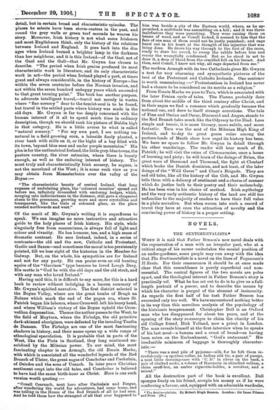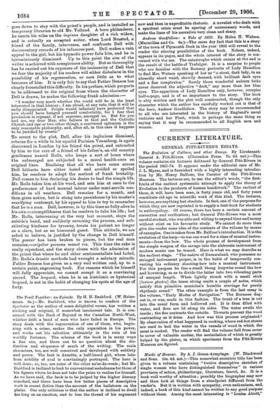NOVELS.
THE SENTIMENTALISTS.*
WHEN it is said that Father Benson's new novel deals with the regeneration of a man with an irregular past, who at a critical stage of his career undertakes the menial position of an under-gardener, some people may run away with the idea that The Sentimentalists is a novel on the lines of Fogazzaro's Ii Santo. For their reassurance it should be at once made clear that this resemblance is purely superficial and non- essential The central figures of the two novels are poles
apart, and the theological interest in Father Benson's story. is
practically nil. What he has set out to do is to give us a full- length portrait of a poseur, and to describe the means by
which his character is purged of the element of insincerity. As regards the first half of his task Father Benson has succeeded only too well. We have encountered nothing better in its way than this merciless analysis of the psychology of the histrionic temperament. Christopher Dell is an Oxford man who has disappeared for about ten years, and at the opening of the story re-emerges to claim the charity of his old College friend, Dick Yolland, now a priest in London. The man reveals himself at the first interview when he speaks of his last meal—a banana and a crust of bread—as having been eaten on the Embankment, "God's restaurant." His irreducible minimum of baggage is thoroughly character- istic :—
" There was a neat pile of pyjamas—silk, for he felt them in- credulously—a spotless collar, an Indian silk tie, a pair of pumps, a neat little dressing-case with 'C. D.' in silver on the back, a pair of clocked socks, a volume of Boccaccio in chiselled vellum, a china snuff-box, an amber cigarette-holder, a revolver, and a missal."
All the destructive part of the book is excellent. Dell sponges freely on his friend, accepts his money as if he were conferring a favour, and, equipped with an admirable wardrobe,
• The Sentimentalists, By Robert Hugh Batman. London; Sir Isaac Pitman and Soul. Leci
goes down to stay with the priest's people, and is installed as temporary librarian to old Mr. Yollaud. A born philanderer,
he exerts his wiles on the ingenue daughter of a rich widow, and is • actually an accepted suitor, when Lord Brasted, a
friend of the family, intervenes, and confronts Dell with documentary records of his infamous past. Dell makes a vain appeal to the girl, but his hypnotic power fails him, and he is ignominiously dismissed. Up to this point the aim of the writer is achieved with conspicuous ability. But so thoroughly has he carried out his exposure of the insincerity of Dell that we fear the majority of his readers will either disbelieve in the possibility of his regeneration, or care little as to what becomes of him. It is only fair to say that Father Benson has clearly forestalled this difficulty. In his preface, which purports to be addressed to the original from whom the character of Dell is drawn, he makes the following frank admission :—
" I wonder very much whether the world will ho in the least interested in that history ; I am afraid, at any rate, that it will be sadly disappointed. People would infinitely have preferred that you should have hanged yourself comfortably, for I fear that pessimism is regnant, if not supreme, amongst us. But for you and me, my dear Max, who believe in God and the Catholic Church and one or two other things, a convinced optimism is the only reasonable philosophy, and, after all, in this case it happens to be justified by events."
To revert to the plot, Dell, after his inglorious dismissal, returns for a while to his squalid Parisian Venusberg, is again discovered in London by his friend the priest, and entrusted
by him to the care of a friend of his father's, an old country gentleman named Rolls, who keeps a sort of home where the submerged are subjected to a moral health-cure on original lines. Realising that all who have come across Dell hitherto have either bated and avoided or spoiled him, he resolves to adopt the method of frank brutality. Dell comes to him declaring his desire to lead the simple life. Mr. Rolls takes him at his word, and sets him at once to the performance of bard manual labour under semi-servile con- ditions in all weathers. Dell remains for a month, and then gives notice, but is stung into persistence by his master's scarifying contempt, by his appeal to him to try to remember that be is a man. Dell, however, is by this time so fully alive to his own contemptibleness that he resolves to take his life ; but Mr. Rolls, intervening at the very last moment, stays the suicide's band, and suddenly reversing the process, and sub- stituting kindness for tyranny, treats his patient no longer as a slave, but as an honoured guest. This attitude, we are asked to believe, is justified by the change in Dell himself. The poseur has been broken to pieces, but the real man remains,—eripitur persona mallet res. This time the rake is really repentant, and the story. closes with the admission of the priest that where he and other sentimentalists had failed, Mr. Rolls's drastic methods bad wrought a salutary miracle. Father Benson has given us a very well written and, up to a certain point, engrossing book. For reasons which he himself will fully appreciate, we cannot accept it as a convincing record. The leopard, when lie is an histrionic or hysterical
leopard, is not in the habit of changing his spots at the age of forty.



































 Previous page
Previous page